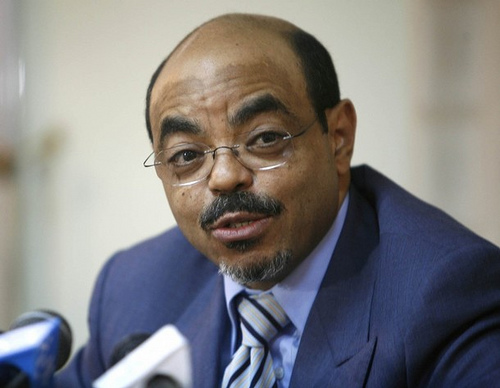Atto Melez Zenawi
Ethiopian premier ready to stand down.
Addis ababa.
June 23, 2009 Ceegaag Online)

Meles Zenawi, Ethiopia’s
prime minister and one of Africa’s more prominent
leaders on the world stage, says he is preparing to step
down and hopes to take with him a generation of government
officials in office since the 1991 overthrow of
Mengistu Haile
Mariam.
Mr Meles, 54, gave no deadline for his departure, which
would be unprecedented in
Ethiopia
and rare among African liberation leaders who have come to
power at the barrel of a gun.
But he insisted in an interview that he would go willingly
and said discussions on when and how had started within the
ruling Ethiopian People’s Revolutionary
Democratic Front (EPRDF).
In theory, a leadership contest could take place at the
EPRDF’s next congress in September, but those diplomats who
take the Ethiopian premier at his word believe he is more
likely to leave office after seeing the party through
elections in a year’s time.
“My personal position is that I have had enough ... I am
arguing my case and the others are also arguing their case.
I hope we will come up with some common understanding on the
way forward that would not require me to resign from my
party that I have fought for all my life,” Mr Meles said.
During 18 years in power Mr Meles has skilfully leveraged
Ethiopia’s strategic position in the
Horn of Africa,
forging strong ties with successive administrations in the
US, Britain
and other European countries, while fending off criticism of
his human rights record and resisting their efforts to use
aid to influence economic policy.
He has also steadily strengthened commercial relations with
China, which has project and other loans to Ethiopia worth
more than $4bn (€2.9bn, £2.4bn), and has encouraged links
between the EPRDF and China’s ruling
Communist
party.
Ethiopia’s economy has been expanding at official growth
rates of above 10 per cent in recent years, evidence, Mr
Meles argues, that the government’s interventionist policies
are working.
He has hinted before that he is ready to step down, but this
is the first time he has suggested publicly that he might
enforce his will by leaving the guerrilla movement he joined
in 1974 and for which he fought over 17 years. It was a
necessary step, he said, to ensure that the EPRDF did not
follow some of its peer groups in
Africa
by falling prey to cronyism and clinging to power for
power’s sake.
“We are not talking about Meles only,” he said. “We are
talking about the old generation. The party needs to have
new leadership that does not have the experience of the
armed struggle.” His comments are likely to stir opposition
among some party peers.
Mr Meles has been consolidating his grip on the EPRDF and
playing a dominant role in government since a split in 2000
over strategy in the
border war
with Eritrea. Many
Ethiopians
remain sceptical of his intentions, believing talk of a
leadership change is a ruse ahead of elections.
The country is still recovering from the trauma of the last
round in 2005, when the government relaxed restrictions on
political parties in the run-up to polls and was then
shocked by opposition gains. Nearly 200 people were killed
and thousands arrested in demonstrations that followed
claims by the opposition to have been robbed of victory.
Two former allies of Mr Meles said the EPRDF had learnt its
lessons and aims to control the
electoral
process more carefully. It was also encouraging a new
generation to join the party and seeking support from
unemployed and younger Ethiopians, through micro-credit and
social
housing schemes, aware that inflation and persistent
food
shortages have raised social tensions.
The opposition has become more fragmented, with many
opponents of the regime in exile and activists in Ethiopia
subject to greater restrictions.
The government said last month it had uncovered a coup plot
tied to exiled opposition leaders. Arrests followed,
including retired and serving army officers.
Mr Meles said that some of those detained admitted planning
to assassinate officials, including himself. But there had
never been any danger that they would pull it off. “There
are more professional terrorists around,” he said.
Source:FT
www.ceegaag.com

webmaster@ceegaag.com |

